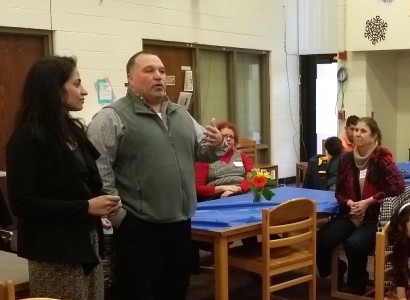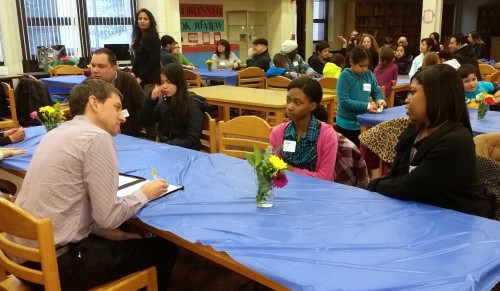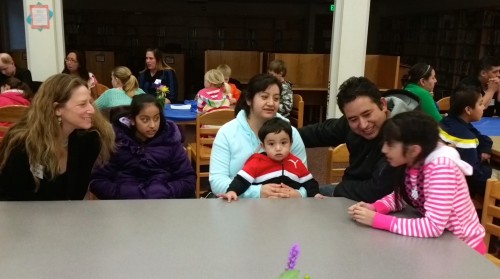
At first, Scarlett Middle School sixth grader Kaylie Herrera was a little nervous at the thought of teachers visiting her home to talk with her and her family.
Until then, the routine was that her family would go to the school. Not the other way around.
“I sorta felt weird and nervous,” said Kaylie, whose family volunteered to participate in this collaborative program between AAPS and the University of Michigan. “But then it was actually kind of fun. I was telling them about myself and my hobbies.”
Between October and February, 47 U-M School of Education interns, working in pairs, conducted three home visits with 24 Scarlett Middle School families. For many of these visits, interns were accompanied by one of 10 Scarlett teachers.
The goal of this Learning Initiatives for Families and Educators (LIFE) program, led by UM clinical assistant professor Debi Khasnabis, was for educators to learn more about students from their families, and then build upon that knowledge to best serve those students. The project and related research is funded by a $50,000 UM Third Century Initiative grant.
The visits allowed interns and teachers to learn about families in new ways. They learned about the cultural and language backgrounds of families, in addition to the kinds of hopes and dreams families have for their children, explained Principal Gerald Vazquez.
He said veteran teachers worked with interns on important questions such as: “How do I help a parent help their kid? How do I help a parent help me as a teacher help their kid at school? How do I understand them culturally or religiously or whatever their background is?”
“Think of the different cultures in our community,” said Vazquez. “For many of them, it was an honor for them to have a teacher in their home, or to have the principal come to their home, and to sit with them to understand what was important from their perspective that we know about their child or about their culture so that it can be affirmed here at school.”
“They really wanted us to understand where they are coming from.”
Vazquez visited two families—one Mexican, one African.
“What I appreciated and learned most was about their desire to have their child pursue an education in an excellent way,” he said. “They place a high value on education.”
He said one family said it would have been impossible back in Africa to pay for such an excellent education as their children are receiving in Ann Arbor.
Lakewood Elementary fourth grade teacher Susan Atkins is a consultant for the LIFE Project. She said that home visits are a very different experience compared to meeting families at school.
“The purpose of our visits were not to inform parents on how their kids were doing, which is usually what we do at school, but to really learn from parents,” Atkins said at the wrap-up event recently that featured a buffet dinner for participants. “So we went into the homes asking them to tell us about their kids, and how their kids best learn, to talk to us about their families and cultural traditions, and to really share with us their expert knowledge on their child and their family situation. We know that type of connection is really different and can really help inform teachers and future teachers about how best to instruct their kids and make connections with them.”
Matt Ronfeldt, assistant professor of educational studies at U-M, said the program is a great way for U-M to partner with AAPS while student teachers learn how to find resources in homes, and leverage those resources in their own teaching.
“But I think it’s also a way for the local community to get a sense of what new teachers are learning,” he said.
Kaylie’s aunt, Adriana Ochoa, said she was impressed by the exchange of information during the set of home visits.
“It’s important for the schools to know how we live,” she said.




Be the first to comment